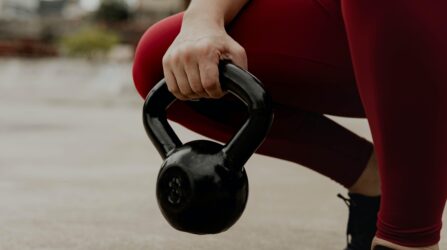-
Written by Rosalie Mountain

You probably already know that during your period, there’s a good chance you’re not at the top of your game. But what about the other parts of your cycle? And how can Menstrual cycle planning help you change your life for the better? Gang, allow us to enlighten you…
Menstrual cycle planning: Understanding your cycle
Adding your cycle’s peaks and troughs into your monthly routine couldn’t be easier. But before you start, you need a clearer picture of what makes up your menstrual cycle.
You’d be forgiven for thinking that once your period ends, that’s that until the next one, cycle-wise. But really, those few days are just one part of a much larger hormone picture.
Breaking down the cycle
Generally speaking, your menstrual cycle is very much a game of two halves, and they are:
The Follicular phase is mostly concerned with prepping your body for a potential pregnancy. Around this time, Estrogen levels are on the rise. And that’s down to your ovaries, busy maturing eggs before ovulation.
Occurring a few days before your period, Ovulation, or when an egg is released from your ovaries, also includes a rise in Progesterone. At this point, you’re probably eating around a liter of Dulce du Leche a day.
That egg-release kick starts the Luteal Phase, and that goes one of two ways. If the egg is fertilized, you’re pregnant. And if it’s not, it’ll begin to break down. This comes with a pretty sharp drop in Progesterone and Estrogen. Which in turn prompts Menstruation, and the whole cycle begins again. Yay!
Menstrual cycle planning: Where to begin?
Once you know more about what’s going on, cycle-wise, you can start to figure out exactly how each phase and shift might be affecting you. Tracking your cycle, beyond period due-dates, might even show you connections between phase and feelings you’d never considered before. Did we say this was enlightening?
So what’s the best way to start planning using your menstrual cycle throughout the month? Firstly, and yes, it is a shameless plug, get yourself the Hormona App. It’ll help you track all your symptoms all month, giving you real-time data about your cycle and hormones. For real gang, it’s fab.
And after that…
The Follicular phase
Menstruation: Scheduling social plans
Knowing your period is imminent can be massively helpful when making plans with friends and family. Of course, the world can’t stop for our periods — although more schemes like Spain’s menstrual leave would be helpful. That said, leaving some space in the calendar when your period is at its heaviest or most painful is never a bad idea.
Here’s why. Estrogen and Progesterone are at their lowest during those first few period days, so you’re more likely to feel sluggish and exhausted. Getting some extra rest on those days could help with your symptoms. Then there’s the fear of leaking or not being able to get to the loo. Staying home takes care of all of that stress. Plus, ice cream.
Which is why planning using your menstrual cycle can be so important. You’ll never be stuck out somewhere wishing you were at home again!
If you do feel able to go out during your period, though, take it easy on the bubbles! Alcohol can cause an increase in Estrogen and Progesterone, which increase irritability and depression. It can also raise your Prostaglandin levels, which trigger cramps. And you’ve likely got enough of those already.
Menstruation: Planning workouts
When your gym teacher told you exercise would help your cramps, they weren’t just dismissing you. Not entirely, anyway. Exercise can help, but it’s not a one size fits all solution. And that goes double if you’re living with Endometriosis and pelvic pain.
At the start of your period, Estrogen and Progesterone are at their lowest, so you might not feel particularly strong. And that means you might not perform as well as you’d like during a run or gym session. Not to mention how uncomfortable cramps and bleeding can make you!
Try adding some low-impact exercise, like walking and yoga, to your schedule. You’ll still get a workout, but your uterus will be happier about it. If you are doing yoga, though, it’s probably best to avoid inversions and headstands.
You Estrogen levels start to climb again towards the end of your period, so you’ll probably notice an increase in energy and motivation. And you might even feel like getting back to your usual routine. But if you don’t, it’s always okay to have a few days off til you do!
Menstruation: Meal planning
Of course, eating a balanced diet is an incredibly useful way of managing hormone health, and even conditions like Endometriosis and PCOS. But during your period, your body is working incredibly hard and demanding more sugary or carby food to fuel it.
So, if you only feel like eating ice cream, that’s okay. If cooking a balanced meal is just too much right now, chucking something in the microwave is better than not eating at all. But planning ahead can make all the difference. Stocking up on snacks, healthy or otherwise, means you get a jump on the cravings and keep your nutrition balanced.
And here’s a handy hint. If you’re a meal prepper, freeze some dishes specifically for your pre-menstrual phase or period. It’ll save your already low energy levels and help maintain a healhy diet.
Menstruation: Sex and relationships
Thanks to hormones, PMS, and whatnot, it’s more than possible that don’t feel like having sex during your period. And that’s absolutely fine. If pain is a part of your pleasure, however, your pain threshold may be lower during this phase. Low Estrogen and Progesterone are linked to higher sensitivity to pain, so you have been warned.
That said, try and let your partner(s) know that your personal limits and boundaries may change throughout your cycle. If you feel comfortable enough, you can even explore it with them and figure it out together!
You might also have noticed a change in your general sex drive during menstruation. Now, we’re not saying you should rigidly plan your sex life, but knowing when you’re less likely to be in the mood can be helpful in all sorts of ways.
Post-period to Ovulation
Roughly halfway through the Follicular phase, around the end of your period, a dominant follicle in your ovaries is busy maturing an egg for release. As the follicle grows, it produces more and more Estrogen. And this rise can give you more energy and generally leave you feeling fabulous.
Post-period to Ovulation: Scheduling social plans
Around this time, socializing might be more fulfilling, less anxiety-inducing, and might come with less fatigue! Higher Estrogen levels can also help temper stress hormones like cortisol. This means high-pressure tasks like presentations or interviews are a breeze because you’re kick-ass.
Post-period to Ovulation: Planning workouts
This rise in energy levels also means exercising is less work. You might feel stronger, able to push yourself harder and be more motivated to move your body.
Not that we’re suggesting you need to, but this is a good time to try high-intensity workouts and long bike rides. Or if you’re feeling super-energetic, now’s a good time to move furniture around or take the kids to activity centers!
Post-period to Ovulation: Working on hobbies and interests
Now, here’s another positive effect higher Estrogen can have. Believe it or not, it can improve your concentration and focus levels. And as if that wasn’t enough, this might also be the time where you feel most inspired creatively, and find more time to spend on hobbies and interests.
So, if you’ve got a test, interview, or parent’s evening coming up, now’s the time for research. Likewise if you’re writing a novel, working on a quilt or a portrait, or anything that requires your brain to be working at full creative capacity.
The Luteal phase
Starting post-ovulation, the Luteal phase is commonly associated with your typical PMS symptoms. These include, but are not limited to, bloating, depression, mood swings, insomnia, and irritability. And this is where planning can be crucial.
Planning using your menstrual cycle means you’ll what’s coming and when. But more importantly, you’ll see in black and white that these feelings won’t last forever.
The Luteal phase: Scheduling social plans
During your Luteal phase, Progesterone increases gradually, before peaking and then dropping off. That increased Progesterone means irritability and mood swings are more likely. So now might not be the best time for difficult conversations. It also might be worth checking in with your therapist or your support system, if you can.
And just for fun, this is the phase that can exacerbate chronic illness symptoms and mental health conditions. So it’s crazy important that you have enough of any medication you take during this time. As is ensuring you have easy access to support.
Think about creating a schedule to pick up or have medication delivered regularly, to ensure you’re never short. Also, make a list of numbers you feel comfortable calling if you’re in a bad place. Or create group chats with friends or family if you just don’t feel like talking.
The Luteal phase: Planning workouts
Fluctuating Progesterone levels can have an effect on your workouts, leaving you more tired. And it can also mess with your temperature regulation. Now, we’re not saying you shouldn’t work out if you feel up to it. But please make sure you stay hydrated and don’t overheat.
And, as when you’re menstruating, it might be worth keeping some of the snacks and meals you prepared earlier in the month on standby for the worst of your PMS!
The Luteal phase: Working on hobbies and interests
In a complete 180 from your Follicular phase, there’s a good chance you’re feeling creatively uninspired and pretty demotivated at this point. Planning motivational outings with friends can help, but you’re under no obligation to do anything. As when you’re menstruating, take it easy and listen to how you feel on the day. Use our routine as a guideline and not a rule!
Menstrual cycle planning: The upshot
Now, we know this is a handy guide, but remember your cycle is just that – yours! Working out the best routine for your individual cycle will likely require some fine-tuning. But as with all good things, it’ll be worth it. As always, be kind to yourself and remember that trying your best is all you can ask.
And while those on birth control, HRT, or living with hormone or gynecological conditions may find their cycles are slightly different than we’ve described, fear not. Tracking how your life is affected by your hormones is essential for all of us. You might even find some relief from your symptoms — forwarned is always forearmed, gang. So get tracking!
Disclaimer: This website does not provide medical advice. The information, including but not limited to, text, graphics, images and other material contained on this website are for informational purposes only. No material on this site is intended to be a substitute for professional medical advice, diagnosis, or treatment. Always seek the advice of your physician or other qualified healthcare provider with any questions you may have regarding a medical condition or treatment or before undertaking a new healthcare regimen, and never disregard professional medical advice or delay in seeking it because of something you have read on this website.

-


Dr Singh is the Medical Director of the Indiana Sleep Center. His research and clinical practice focuses on the myriad of sleep.




